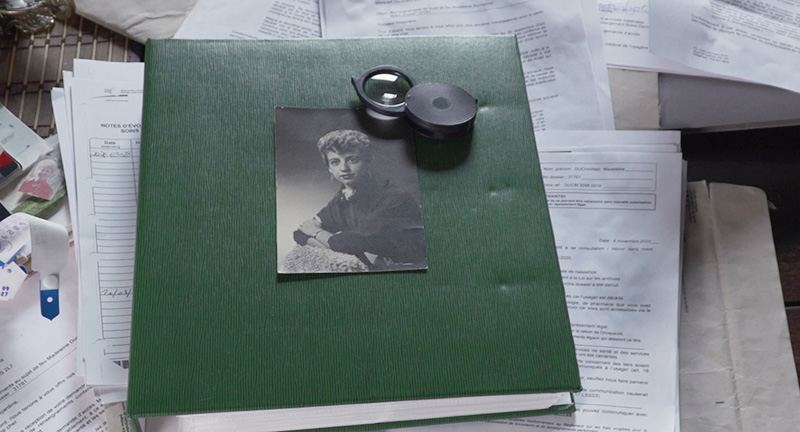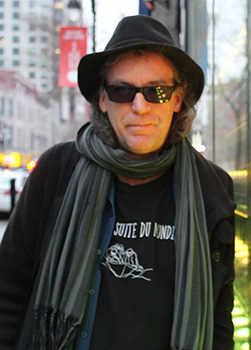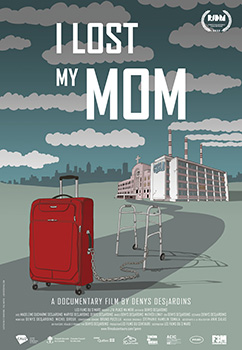I Lost My Mom
Review by Maurie Alioff – Québec Correspondent
(May 30, 2023 – Montréal, QC) Winner of Hot Docs 2023’s Best Canadian Feature Documentary Award, Denys Desjardins’s I Lost My Mom is an excruciatingly intimate film. It’s one thing to depict the indignities suffered by elderly people suffering from Alzheimer’s and other diseases, it’s another to deep focus on your deteriorating mother.
As old home movies make clear, Desjardins’s mom Madeleine was a smiling, vibrant woman who loved her son deeply. Even in old age, she loves movement and has a sense of humour. But when she needs to move into a residence for the elderly, she resists, fearful of being imprisoned by illness and an icy, bureaucratic system. Early in the film, as her medical issues get more severe, her residence insists it wants to “re-locate” her to a bleak final destination, presumably with appropriate medical care.

Transferring Madeleine to these facilities is painful for her, Desjardins, and his sister Maryse, who appears often in the doc. When Madeleine reaches her second circle of hell, Desjardins films himself and Maryse driving toward her and looking up at forbidding buildings with depressing phone calls and voice messages on the soundtrack. We hear ultimatums from Madeleine’s residence and various agencies. Put your mother where we tell you to, or find your own way.
 As Desjardins pointed out in a Q & A that followed the screening I watched, the majority of sick elderly people in Scandinavia stay put with government subsidized home care. Many speculate that home care, apart from being more humane, is cheaper than covering all the maintenance and staffing costs of large buildings.
As Desjardins pointed out in a Q & A that followed the screening I watched, the majority of sick elderly people in Scandinavia stay put with government subsidized home care. Many speculate that home care, apart from being more humane, is cheaper than covering all the maintenance and staffing costs of large buildings.
A close cousin of mine in B.C. died a few years after leaving the apartment she loved, and living in two different residences, both considered quality locations. I know someone else who’s life has been horribly curtailed by a virulent form of Parkinson’s Disease. She at least has the comfort of familiar surroundings and continuity: her books, caregivers who actually care about her, the TCM movie Channel, and so on. While her mobility and speech have badly diminished, caregivers still take her for adapted exercises at Montreal’s Cummings Centre, with its warm, well-equipped crew and pretty surroundings.
No such luck for Madeleine. Her only freedom is a cramped balcony. Desjardins and Maryse agonize over her mother dying in a sterile, forbidding location. Even when Madeleine can’t remember who her son is, she still flashes a smile and sings a tune she loved. She’s still alive.
 The brother and sister, resisting a system that sees their mother as “an object,” manage to get her into a hospital, rather than an “interim location,” that is relatively acceptable. It’s a long trek from their homes, and it’s opposite a prison, but it’s preferable for the 88-year-old woman they love. Summer comes and an outdoor entertainer lip synchs Paul Anka’s Diana. Madeleine dances. “Love is the best cure,” Desjardins says in voiceover.
The brother and sister, resisting a system that sees their mother as “an object,” manage to get her into a hospital, rather than an “interim location,” that is relatively acceptable. It’s a long trek from their homes, and it’s opposite a prison, but it’s preferable for the 88-year-old woman they love. Summer comes and an outdoor entertainer lip synchs Paul Anka’s Diana. Madeleine dances. “Love is the best cure,” Desjardins says in voiceover.
Then in the movie’s final, harrowing act, Covid strikes. Desjardins and Maryse can no longer visit Mom, or even get clear answers about her health. In static wide shots, we see Desjardins staring up at the faceless building Madeleine is trapped in while more voice messages and phone calls play out on the track. Is mom sick, not sick? Nobody seems to be 100% sure. The penultimate horror for Desjardins and Maryse is that their mother is on the verge of dying alone without signs of love, the real healer.
Desjardins resolves the escalating tension with the most intimate images imaginable and a heartbreakingly beautiful montage of Madeleine. At the same time, he says that nobody ever recovers from the death of their mother.
As of this date, no release date has been announced.
![]() Maurie Alioff is a film journalist, critic, screenwriter and media columnist. He has written for radio and television and taught screenwriting at Montreal’s Vanier College. A former editor for Cinema Canada and Take One, as well as other magazines, he is affiliated with the Quebec media industry publication, CTVM.Info. His articles have appeared in various publications, including Canadian Cinematographer, POV Magazine, and The New York Times. He is the Québec Correspondent for northernstars.ca.
Maurie Alioff is a film journalist, critic, screenwriter and media columnist. He has written for radio and television and taught screenwriting at Montreal’s Vanier College. A former editor for Cinema Canada and Take One, as well as other magazines, he is affiliated with the Quebec media industry publication, CTVM.Info. His articles have appeared in various publications, including Canadian Cinematographer, POV Magazine, and The New York Times. He is the Québec Correspondent for northernstars.ca.


